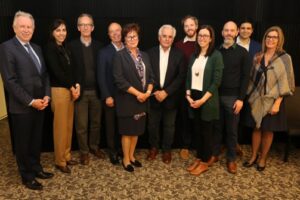Expandable List
This initiative has several foci with the overall aim of transferring or modifying the microbiota for therapeutic gain in chronic GI and non-GI disorders. Hitherto, microbial transfer has been fecal but we are now moving towards transfer of lyophilized material either from feces or cultures. Microbial transfer studies involve preclinical models (humanized mouse models), as well as adult and pediatric patients. Current projects include the evaluation of FMT in inflammatory bowel disease in adults and children, developing microbial consortia for specific disease indications and microbiome derived probiotics. A new lyophilization facility will optimize methods for improved bacterial stability, long term storage and delivery. This has been made possible by a generous donation from the Paul Douglas Family.

Bacteriophages are powerful yet gentle antibacterial agents with distinct advantages over antibiotics. Phage therapeutics needs custom-designed technologies that meet the standard of care in modern medicine. This is an area where bioengineering can be a game changer and research in the phage bioengineering in the Hosseinidoust lab aims to achieve this goal (https://www.hosseinidoustlab.com/).
Work in the Hynes lab aims determine the roles of phages in shaping microbial populations within us, as well as learn to manipulate the phages to influence the microbiota for experimental and therapeutic gain (https://farncombephage.org/)
Part of our Nutrition Initiative evaluates the ability of specific nutrients to improve host function via the microbiota, and includes fibers such as psyllium and pectin, as well as tryptophan supplements, among others. Various laboratories within the Institute evaluate the therapeutic potential of probiotic bacteria in their models, as well as in patient populations. A recent example of this was the demonstration that Bifidobacterium longum alters mood initially in animal models and subsequently in humans.
A more recent addition to our Microbial Therapy Initiative is a funded collaborative investigation with APC Microbiome Ireland that aims to teach or “condition” the microbiome for therapeutic gain. The lead PI in the Farncombe Institute is Dr. Alex Hynes.
